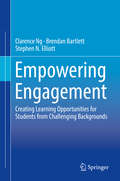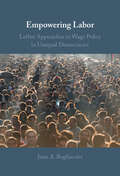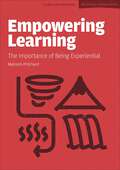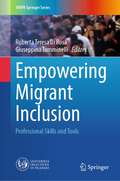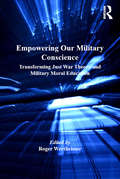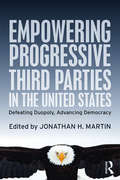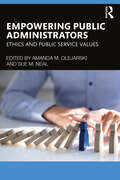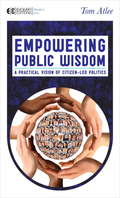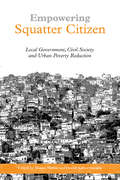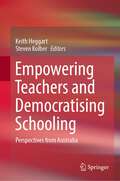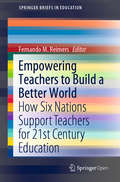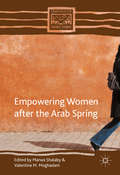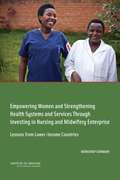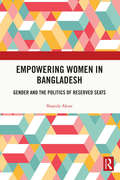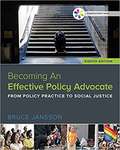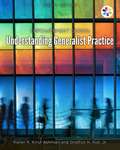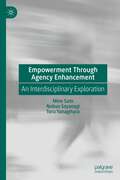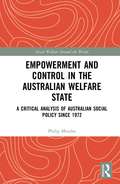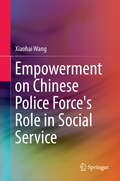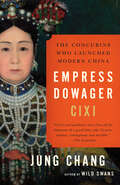- Table View
- List View
Empowering Engagement: Creating Learning Opportunities for Students from Challenging Backgrounds
by Stephen N. Elliott Clarence Ng Brendan BartlettThis book examines promoting engagement for children and adolescents from challenging contexts or who are dealing with challenging conditions. The volume concentrates on three vulnerable groups: marginalized youths who have experienced repeated exclusion and sought their second chance in alternative education; children who are coming from economically, culturally, and linguistically disadvantaged backgrounds; and students with social or emotional issues. It defines engagement as evolving over the course of learning, an interpersonal as well as personal process involving students, learning environment, teachers, and peers. Chapters identify the complex personal, sociocultural, economic, and systemic barriers that keep these vulnerable students from fully engaging in school, and explore the enabling role of collaborative and supported learning activities in building academic success and a foundation for productive adult lives. In addition, chapters present instructional practices based on engagement enablers. Chapters also pinpoint specific learning skills and subject areas that can provide openings for promoting motivation and participation. Featured topics include: The importance of cognitive and social enablers for promoting learning engagement.Engagement in instruction from teachers and testing within classrooms.Student voice and perspective as a reading engagement enabler.Promoting academic engagement and aspiration for challenging and advanced mathematics.Alternative educational programs for re-engaging marginalized youths who “don’t fit”.Empowering Engagement is a must-have resource for researchers, scientist-practitioners, clinicians, and graduate students in the fields of child and school psychology, educational policy and politics, social work, motivation and learning, schooling and pedagogies, and related disciplines.
Empowering Labor: Leftist Approaches to Wage Policy in Unequal Democracies
by Juan A. BogliacciniEmpowering Labor uses a comparative study of Chile, Portugal, and Uruguay to analyze the underlying political dynamics that shape the use of wage policy as a pre-distributive instrument of leftist parties in power in unequal democracies. The book theorizes that the unity of the Left and labor's political legitimacy are two main drivers for relating on wage policy as a pre-distributive instrument for promoting inclusion. These factors are shaped by elite long-term strategies towards labor. Such strategies, when dominant for long-enough periods, create path dependency, shaping differential opportunities for further options down the road. The book integrates large-scale historical processes with frequently analyzed short-term and agency-based factors to elucidate variation in the crafting of wage policies and reshapes the debate on the politics of pre-distribution in unequal democracies by situating the cases in a longer historical arc.
Empowering Learning: The Importance Of Being Experiential (World Class Schools)
by Dr Malcolm Pritchard Malcolm PritchardExperience - it is our first teacher in life, our early warning system, and our guide to world discovery. Experience connects the inner self to the outer world. It shapes our thoughts, informs our attitudes, motivates our actions. It is the most common mode of learning for all of humanity. Yet, hidden in plain sight, experiential learning is largely taken for granted by educators and researchers. We assume that experience is largely educational. We simply 'learn by doing' - don't we? There is a world of difference between 'doing' and 'doing intelligently'. By understanding how experience acts as a mechanism to inspire and scaffold memorable learning, we stand to gain greater control over this most powerful and universal force in human development. Learning, empowered by experience, is life-changing for learners; experience, purposefully harnessed, is transformational for schools.
Empowering Learning: The Importance Of Being Experiential (World Class Schools)
by Dr Malcolm Pritchard Malcolm PritchardExperience - it is our first teacher in life, our early warning system, and our guide to world discovery. Experience connects the inner self to the outer world. It shapes our thoughts, informs our attitudes, motivates our actions. It is the most common mode of learning for all of humanity. Yet, hidden in plain sight, experiential learning is largely taken for granted by educators and researchers. We assume that experience is largely educational. We simply 'learn by doing' - don't we? There is a world of difference between 'doing' and 'doing intelligently'. By understanding how experience acts as a mechanism to inspire and scaffold memorable learning, we stand to gain greater control over this most powerful and universal force in human development. Learning, empowered by experience, is life-changing for learners; experience, purposefully harnessed, is transformational for schools.
Empowering Migrant Inclusion: Professional Skills and Tools (UNIPA Springer Series)
by Roberta Teresa Di Rosa Giuseppina TumminelliThis book explores key issues on the relational and operational dimension of the professional actions aimed at ensuring the well-being and inclusion of migrants in the reception system. Starting from the assumption that well-being is a multi-level phenomenon related to different and complex questions, the chapter authors articulated their reflections developing some thematic contents, complementary to one another, from the perspectives of different social actors involved in the inclusion process. A special attention is paid to the risk factors as potential obstacles to the inclusion, not only in the achievement of well-being but also in the relationship with the receiving society and with the reception system. Case studies will be presented to show how this complexity is explored integrating different theoretical perspectives with the participation of all social actors involved in inclusion pathways (unaccompanied migrant minors, immigrant families, refugees, social operators, voluntary guardians). The authors share the social responsibility in investing in human and professional resources in the reception system and in connecting it with the local community. Updating the social workers’ tools and methods become more and more relevant to enable the diffusion of new skills, functions, and roles in the management of reception of migrant minors and adults.
Empowering Migrant Women: Why Agency and Rights are not Enough (Gender in a Global/Local World)
by Leah BrionesBased on insights from Filipina experiences of domestic work in Paris and Hong Kong, this volume breaks through the polarized thinking and migration-centric policy action on the protection of migrant women domestic workers from abuse to link migrants' rights and victimization with livelihood, migration and development. The book contextualizes agency and rights in the workers' capability to secure a livelihood in the global political economy and is instrumental in making the problem of migrant women workers' empowerment both a migration and development agenda. The volume is essential reading for social scientists, bureaucrats and non-governmental political activists interested in the protection of the rights and livelihoods of migrants. It will also appeal to migration and feminist scholars who have yet to adopt the contribution of critical development studies in the analysis of low-skilled female labour migration.
Empowering Our Military Conscience: Transforming Just War Theory and Military Moral Education (Military and Defence Ethics)
by Roger WertheimerResponding to increasing global anxiety over the ethics education of military personnel, this volume illustrates the depth, rigour and critical acuity of Professional Military Ethics Education (PMEE) with contributions by distinguished ethical theorists. It refreshes our thinking about the axioms of just war orthodoxy, the intellectual and political history of just war theorizing, and the justice of recent military doctrines and ventures. The volume also explores a neglected moral dimension of warfare, jus ante bellum (the ethics of pre-war practices) - particularly jus in disciplina bellica (the ethics of educating for warfare). Using metaphor to exemplify the professionalization of the military, the book exposes ambivalences within military professionals' concepts of their professional responsibilities, analyzes issues of self-respect posed by service in an unjust cause, and surveys the deep conflicts inherent in PMEE. While primarily focused on US military academies, the volume will resonate with those responsible for education in military academies across the globe.
Empowering Progressive Third Parties in the United States: Defeating Duopoly, Advancing Democracy
by Jonathan H. MartinThis ground-breaking collection of writings explores how progressive third parties in the U.S. can become more electorally successful and politically influential. It is the only recently published book that focuses exclusively on how such parties may advance. Their rise may be essential to countering the powerful, growing sway of wealth within the two major American parties, and to creating a more just, democratic United States. Contributors include key participants in and observers of the U.S. left third party movement. Nearly all have previously authored books or articles on progressive politics. Many have led effective left third party efforts, and some have held elected office on behalf of a progressive third party. Together the writers reflect on a wide range of relevant parties--including the Green Party, the Vermont Progressive Party, the Labor Party, the Working Families Party, Socialist Alternative, and potential new parties on the American left. The authors highlight a variety of strategies and conditions that may facilitate electoral breakthroughs by such parties and their candidates. Overall, the collection suggests that U.S. progressive third parties may make more headway if they thoughtfully combine their idealism and sense of urgency with a flexible, pragmatic approach to gaining power.
Empowering Public Administrators: Ethics and Public Service Values
by Amanda M. Olejarski and Sue M. NealPublic administrators need to be empowered to make difficult decisions. Acting in the public interest often means doing what is ethical even when it is an unpopular choice. Yet, too often, public servants at the local, state, and federal levels internalize the notion that their hands are tied and that they are limited in their ability to effect change. Empowering Public Administrators: Ethics and Public Service Values provides a much-needed antidote to inaction, offering a new lens for viewing administrative decision-making and behavior. This book makes a case for bringing historically significant theories to the forefront of public service ethics by applying them to a series of current ethical challenges in practice. Exploring administrative discretion as modern bureaucrats govern public affairs in a political context, this collection builds on the normative foundations of public administration and provides readers with a scaffold for understanding and practicing public service values. Questions for discussion and applications to practice are included in each chapter making this collection of interest to public affairs master’s and doctoral students as well as public service practitioners.
Empowering Public Administrators: Ethics and Public Service Values
by Amanda M. Olejarski and Sue M. NealPublic administrators need to be empowered to make difficult decisions. Acting in the public interest often means doing what is ethical even when it is an unpopular choice. Yet, too often, public servants at the local, state, and federal levels internalize the notion that their hands are tied and that they are limited in their ability to effect change. Empowering Public Administrators: Ethics and Public Service Values provides a much-needed antidote to inaction, offering a new lens for viewing administrative decision-making and behavior.This book makes a case for bringing historically significant theories to the forefront of public service ethics by applying them to a series of current ethical challenges in practice. Exploring administrative discretion as modern bureaucrats govern public affairs in a political context, this collection builds on the normative foundations of public administration and provides readers with a scaffold for understanding and practicing public service values. Questions for discussion and applications to practice are included in each chapter making this collection of interest to public affairs master’s and doctoral students as well as public service practitioners.
Empowering Public Wisdom
by Tom AtleeLifelong activist Tom Atlee proposes innovative ways to distill the wisdom of ordinary people in order to better guide public policy. In Empowering Public Wisdom, Atlee recognizes currently popular forms of progressive democracy advocates, such as citizen participation and voter education, but suggests that what is really needed is a re-thinking of the very concept of democracy; Atlee advocates the use of "public wisdom," a collective intelligence that can be drawn upon to guide public policy and action. Reaching beyond partisan politics, Atlee explores how a diversity of views can be engaged around public issues in ways that generate a coherent, shared "voice of the people" that takes most or all of the population's perspectives and needs into account. Atlee's core approach is through "citizen deliberative councils," in which a small group of people randomly selected creates a "mini-public" or a microcosm of the larger population. Citizen councils engage in the study of a public issue and make recommendations to public officials and the community, but disband afterward; when a new issue arises, a new council is formed. Ultimately, Atlee aims even higher, suggesting a possible fourth branch of government to better balance our current democratic system. Combining a radical vision with practical solutions, Empowering Public Wisdom provides a unique and refreshing voice in the political arena.Empowering Public Wisdom is part of the EVOLVER EDITIONS Manifesto Series.From the Trade Paperback edition. on co-intelligence holds some of the keys to enabling us to work with the ever-more complex opportunities in human existence." -- Robert Theobald, author of Turning the Century and The Rapids of Change"Tom Atlee is a unique soul who is fostering the awakening of our collective wisdom."-- Duane Elgin, author of Voluntary Simplicity and Promise Ahead"Tom Atlee's work is an important contribution to the world I want to create." -- Stewart Levine, Esq, author of Getting to Resolution and The Book of Agreement
Empowering Squatter Citizen: Local Government, Civil Society and Urban Poverty Reduction
by David Satterthwaite Diana MitlinWith the rapid growth in urban poverty in Africa, Asia and Latin America, most cities now have 30 to 60 per cent of their population living in shanty towns. The civil and political rights of these people are either ignored or constantly contravened. They face multiple deprivations, including hunger, long hours working for inadequate incomes; illness, injury and premature deaths that arise from dangerous living conditions and inadequate water supplies, sanitation and healthcare. Many face the constant threat of eviction and other forms of violence. None of these problems can be addressed without local changes, and Empowering Squatter Citizen contends that urban poverty is underpinned by the failure of national governments and aid agencies to support local processes. It makes the case for redirecting support to local organizations, whether governmental, non-governmental or grassroots. . The book includes case studies of innovative government organizations (in Thailand, Mexico, Philippines and Nicaragua) and community-driven processes (in India, South Africa, Pakistan and Brazil), which illustrate more effective approaches to urban poverty reduction. Such approaches include strengthening the organizations of the poor and homeless so that they are accountable to their members, are able to develop their own solutions and have more capacity to negotiate with the institutions that are meant to deliver infrastructure, services, credit and land for housing. Such support for local processes is crucial for meeting the Millennium Development Goals in urban areas.
Empowering Teachers and Democratising Schooling: Perspectives from Australia
by Keith Heggart Steven KolberThis edited book brings together teachers and education academics who are committed to education about, for and through democracy. It presents a diverse range of viewpoints about the challenges facing educators working across different sectors and discusses ways to challenge issues like neoliberalism, excessive managerialism and accountability and privatisation. It also engages with the times that education has, and continues, to fail students. This book outlines both logistical and ideological challenges which educators committed to democracy face and describes innovative approaches they have adopted, including networking, the use of social media and digital tools and extending their reach beyond their local communities to international audiences. It encourages conversations about how educators and academics might re-commit to education for democracy and generate further avenues for discussion and action by educators and academics.
Empowering Teachers to Build a Better World: How Six Nations Support Teachers for 21st Century Education (SpringerBriefs in Education)
by Fernando M. ReimersThis open access book presents a comparative study on how large-scale professional development programs for teachers are designed and implemented. Around the world, governments and educators are recognizing the need to educate students in a broad range of higher order cognitive skills and socio-emotional competencies, and providing effective opportunities for teachers to develop the expertise needed to teach these skills is a crucial aspect of effective implementation of curricula which include those goals. This study examines how large-scale efforts to empower teachers for deeper instruction have been designed, how they have been implemented, and their outcomes. To do so, it investigates six programs from England, Colombia, Mexico, India, and the United States. Though all six are intended to broaden and deepen students’ curricular aspirations, each takes this expansion of curricular goals in a different direction.The ambitious education reforms studied here explicitly focus on building teachers’ capacity to teach on a broader set of goals. Through a discerning analysis of program documents, evaluations, and interviews with senior leaders and participants in the programs, the book identifies the various theories of action used in these programs, examines how they were implemented, and discusses what they achieved. As such, it offers an indispensable resource for education leaders interested in designing and implementing professional development programs for teachers that are aligned with ambitious instructional goals.
Empowering Women after the Arab Spring (Comparative Feminist Studies)
by Marwa Shalaby and Valentine M. MoghadamWith studies on the United Arab Emirates, Qatar, Syria, Lebanon, Morocco and Tunisia, this collection presents a theoretical framework on the study of women's empowerment amid the transformations that have shaped the social and political fabrics of Arab societies.
Empowering Women and Strengthening Health Systems and Services Through Investing in Nursing and Midwifery Enterprise: Workshop Summary
by Patricia A. CuffIn September 2014, the Global Forum on Innovation in Health Professional Education and the Forum on Public-Private Partnerships for Global Health and Safety of the Institute of Medicine convened a workshop on empowering women and strengthening health systems and services through investing in nursing and midwifery enterprise. Experts in women's empowerment, development, health systems' capacity building, social enterprise and finance, and nursing and midwifery explored the intersections between and among these domains. Innovative and promising models for more sustainable health care delivery that embed women's empowerment in their missions were examined. Participants also discussed uptake and scale; adaptation, translation, and replication; financing; and collaboration and partnership. "Empowering Women and Strengthening Health Systems and Services Through Investing in Nursing and Midwifery Enterprise" summarizes the presentations and discussion of the workshop. This report highlights examples and explores broad frameworks for existing and potential intersections of different sectors that could lead to better health and well-being of women around the world, and how lessons learned from these examples might be applied in the United States.
Empowering Women in Bangladesh: Gender and the Politics of Reserved Seats
by Shajeda AktarThis book investigates the deep linkages between gender and grassroots politics. It studies how women candidates in Bangladesh are elected in reserved seats in the local government bodies and explores the challenges that they face both from within the domestic unit and from the government administration. The book focuses on grassroots-level governance and provides a comparative study between selected rural and urban local government institutions in different socio-economic, educational, and cultural contexts. It documents loopholes in the system of quota seats for women, allocation of electoral constituency, and elected representatives’ rights and responsibilities. It also studies the life-changing impact of women at different levels of governance and society and offers important policy implications for furthering their participation and empowerment. A major intervention in the study of Bangladesh and its politics, this key text will be of great interest to scholars and researchers of political science, public administration, gender studies, public policy, and South Asian studies.
Empowering the Great Energy Transition: Policy for a Low-Carbon Future
by Scott Valentine Benjamin Sovacool Marilyn BrownAt a time when climate-change deniers hold the reins of power in the United States and international greenhouse gas negotiations continue at a slow crawl, what options are available to cities, companies, and consumers around the world who seek a cleaner future? Scott Victor Valentine, Marilyn A. Brown, and Benjamin K. Sovacool explore developments and strategies that will help fast-track the transition to renewable energy. They provide an expert analysis of the achievable steps that citizens, organizational leaders, and policy makers can take to put their commitments to sustainability into practice.Empowering the Great Energy Transition examines trends that suggest a transition away from carbon-intensive energy sources is inevitable—there are too many forces for change at work to stop a shift to clean energy. Yet under the status quo, change will be too slow to avert the worst consequences of climate change. Humanity is on a path to incur avoidable social, environmental, and economic costs. Valentine, Brown, and Sovacool argue that new policies and business models are needed to surmount the hurdles separating the current consumption model from a sustainable energy future. Empowering the Great Energy Transition shows that with well-placed efforts, we can set humanity on a course that supports entrepreneurs and communities in mitigating the environmental harm caused by technologies whose time has come and gone.
Empowerment Series: Becoming An Effective Policy Advocate
by Bruce JanssonJansson's BECOMING AN EFFECTIVE POLICY ADVOCATE teaches you the ins and outs of conducting policy practice, preparing you to become an effective policy advocate during your own career. The eighth edition's coverage includes discussion of such events and issues as Barack Obama's presidency, the presidential primaries and election of 2016, the battle over equality among national politicians in 2016, and many issues facing social agencies. By going beyond the traditional foundational approach to policy, this text helps you develop the skills you need to become an advocate for social change. It offers you practical guidance on how to develop social media campaigns, and discusses ways you can participate in reducing inequality -- the issue that drew the attention of millions of millennials in the presidential election of 2016.
Empowerment Series: Understanding Generalist Practice
by Karen K. Kirst-Ashman Grafton H. Hull<P>Organized around the authors' coherent and cohesive Generalist Intervention Model, this introductory guide to generalist social work practice gives your students the knowledge and skills they need to work with individuals and families and the foundation knowledge from a generalist perspective to work with groups, communities, and organizations.<P> This edition continues to emphasize the interrelationship between the micro, mezzo, and macro levels of social work practice; and it reflects the latest Educational Policy and Accreditation Standards with empowerment and strengths perspectives for partnering with clients.
Empowerment Through Agency Enhancement: An Interdisciplinary Exploration
by Mine Sato Nobuo Sayanagi Toru YanagiharaThis book focuses on the understanding of factors and mechanisms involved in the development of agency mainly in three related contexts --- participatory development, extension work, and service transactions. The research has its starting point in the recognition of the critical role played by “agency” (commonly understood as want/will for and practice of self-determination and self-management) on the part of intended beneficiaries of services and projects for effective implementation and sustainability. It is designed to address this subject matter with its principal focus on inner capacities and orientations of human beings, posing questions as to how such capacities and orientations could be enhanced and activated in practice by external actors in the field of public policies for socioeconomic and international development. The project is organized transcending traditional disciplinary boundaries --- combining anthropological, psychological, and economic approaches and perspectives.
Empowerment and Control in the Australian Welfare State: A Critical Analysis of Australian Social Policy Since 1972 (Social Welfare Around the World)
by Philip MendesThis book explores the tensions between the competing social rights and social control functions of the modern Australian welfare state. By critically examining the history and rhetoric of the Australian welfare state from 1972 to the present day, and using the author’s long-standing research on the Australian Council of Social Service and other welfare advocacy groups, it analyses the transformation from rights-based to conditional welfare. The Labor Party Government from 1972-75 is identified as the only clear cut example of Australia positively using welfare payments and services as an instrument to promote greater social equity, inclusion and participation. Since the mid-1970s, the Australian welfare state has gradually retreated from the social rights agenda conceived by the Whitlam Government. Australia has followed other Anglo-Saxon countries in adopting increasingly conditional and paternalistic measures that undermine the protection of social citizenship outside the labour market. In contrast, this text makes the case for an alternative participatory and decentralized welfare state model that would prioritize social care by empowering and supporting welfare service users at a local community level. This book will be of interest to academics, students and policy-makers working within social policy, social work and political sociology.
Empowerment on Chinese Police Force's Role in Social Service
by Xiaohai WangThis is the first scholarly book to explore the empowerment and the social service role of frontline police officers in the People's Republic of China. It approaches the study of role strain and empowerment, informed by local empirical data and personal experience. Thematically organized and focusing on those issues of greatest concern to the public, such as the dual social control (informal and formal) mechanism, mass line policing, strike-hard campaigns, police professionalization and professional ethics, as well as the paramilitary-bureaucratic structure in the Chinese police organization, it provides a detailed discussion of these and other contemporary issues. The book offers a valuable resource for students and researchers in the area of comparative policing and comparative criminal justice, as well as police professionals and policy-makers.
Empress Alexandra: The Special Relationship Between Russia's Last Tsarina and Queen Victoria
by Melanie CleggThis intimate look at the bond between Queen Victoria and her granddaughter is “full of details regarding many European royals . . . thoroughly engrossing”(Kathryn J. Atwood, author of Women Heroes of World War II).When Queen Victoria’s second daughter Princess Alice married the Prince Louis of Hesse and Rhine in 1862, even her own mother described the ceremony as “more of a funeral than a wedding,” thanks to the fact that it took place shortly after the death of Alice’s beloved father, Prince Albert. Sadly, the young princess’s misfortunes didn’t end there and when she also died prematurely, her four motherless daughters were taken under the wing of their formidable grandmother, Victoria. Alix, the youngest of Alice’s daughters and allegedly one of the most beautiful princesses in Europe, was a special favorite of the elderly queen, who hoped that she would marry her cousin Prince Albert Victor, Duke of Clarence and one day reign beside him. However, the spirited and stubborn Alix had other ideas…
Empress Dowager Cixii: The Concubine Who Launched Modern China
by Jung ChangFrom the beloved, internationally bestselling author of Wild Swans, and co-author of the bestselling Mao: The Unknown Story, the dramatic, epic biography of the unusual woman who ruled China for 50 years, from concubine to Empress, overturning centuries of traditions and formalities to bring China into the modern world. A woman, an Empress of immense wealth who was largely a prisoner within the compound walls of her palaces, a mother, a ruthless enemy, and a brilliant strategist: Chang makes a compelling case that Cixi was one of the most formidable and enlightened rulers of any nation. Cixi led an intense and singular life. Chosen at the age of 12 to be a concubine by the Emperor Xianfeng, she gave birth to his only male heir who at four was designated Emperor when his father died in 1861. In a brilliant move, the young woman enlisted the help of the Emperor's widow and the two women orchestrated a coup that ousted the regents and made Cixi sole Regent. Untrained and untaught, the two studied history and politics together, ruling the huge nation from behind a curtain. When her boy died, Cixi designated a young nephew as Emperor, continuing her reign till her death in 1908. Chang gives us a complex, riveting portrait of Cixi through a reign as long as that of her fellow Empress, Victoria, whom she longed to meet: her ruthlessness in fighting off rivals; her curiosity to learn; her reliance on Westerners who she placed in key positions; and her sensitivity and desire to preserve the distinctiveness of China's past while overturning traditions (she, as Chang reveals--not Mao, as he claimed--banned footbinding) and exposing its culture to western ideas and technology.
